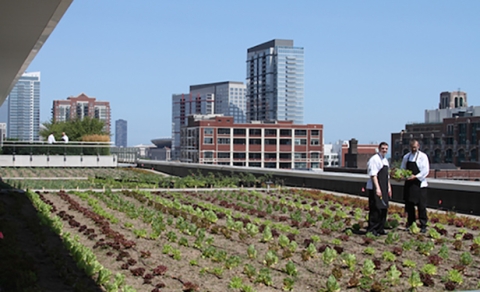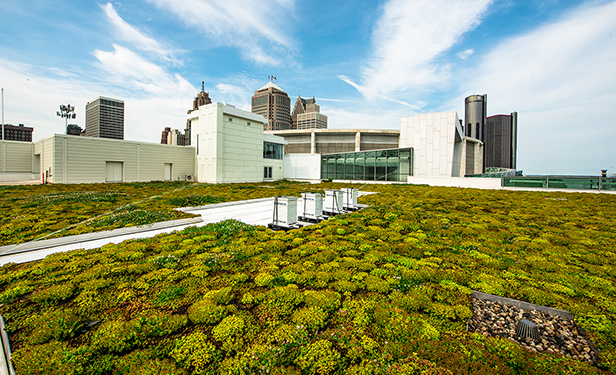How Chicago’s McCormick Place and Detroit’s TCF Center Are Amplifying Green Efforts

As the importance of lessening the environmental impact of meetings, trade shows and events only continues to grow, here’s what two Midwestern convention centers are doing to help make sustainable planning easier.
McCormick Place
With nearly 3 million visitors each year, McCormick Place, North America’s largest convention center, has a large environmental footprint. However, for more than a decade, the 2.6 million-square-foot facility has been actively creating a more sustainable campus. In the last few months, the campus has taken two major steps forward.
- With installation of the sustainable food waste system Grind2Energy in May 2019, McCormick Place now diverts nearly 100 percent of its pre-consumer food waste from landfills. In the first six months of use, this amounted to more than 25 tons of food waste. Grind2Energy, which converts food waste into renewable energy through anaerobic digestion, is being used in conjunction with composting and other traditional methods of food waste diversion.
- In September, work began on a $36 million dollar investment to retrofit the lights in McCormick Place and the parking lots with energy-efficient LEDs. The switch to LED lights will save energy, reduce maintenance costs from new fixtures and improve lighting, according to the center’s officials.
In addition, McCormick Place is also home to the Midwest’s largest outdoor rooftop garden (measuring 20,000 square feet), which produces approximately 8,000 lbs. of produce each year that is consumed on its campus, including growing hops to be brewed into beer. They also shop local: One-third of all food purchased at McCormick Place is local, organic or environmentally preferred, and this includes sustainable seafood, meats raised without antibiotics and other farm-to-fork favorites from local businesses.
TCF Center

Formerly known as Cobo Center, Detroit’s 2.4-million-sq.ft. TCF Center is the venue of choice for many huge trade shows, including the North American International Auto Show.
In October 2019, it became the largest LEED-certified building in the state of Michigan when it was awarded LEED Gold certification by the U.S. Green Building Council for attributes such as parking spaces on the living green roof, highly efficient water use and zero-waste practices. In addition, it recently underwent a $279 million upgrade that incorporated green components such as low-flow equipment in kitchens and restrooms and more energy-efficient HVAC equipment.
Here’s what else the venue is doing to decrease its environmental footprint:
- Centerplate, TCF’s catering services provider, recently hired sustainability consultancy Astrapto to help create a food waste reduction program.
- Through partnering with Forgotten Harvest, Detroit’s leading food redistribution agency, Centerplate in TCF Center donated more than 8 tons of unserved food (or 12,000 meals) to feed people in the Detroit area in 2019.
- TCF Center offers a wide range of options for customers including local culinary, vegetarian and vegan meals.
- It offers a zero-waste attendee education program that promotes reasonable portions, composting, recycling, plastic bottle alternatives and more. In June 2019, it was host to the Sustainable Brands annual conference, which recorded a record 100-percent diversion rate.
What green practices are you most looking for in trade show venues? Tell us on Twitter, @TSNN_com_US.


Add new comment